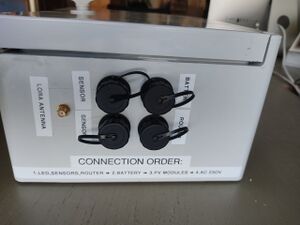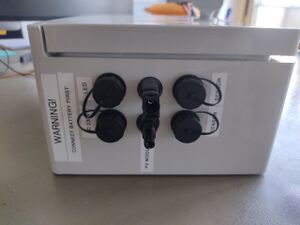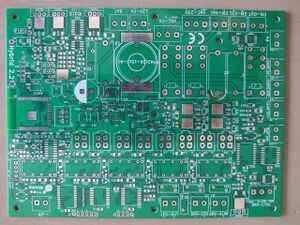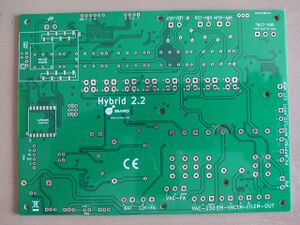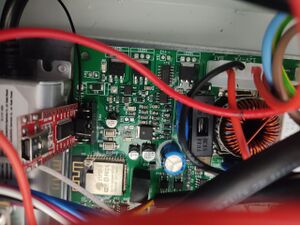Diferència entre revisions de la pàgina «Siarq's Hybrid 2.2»
m |
m (→PCB) |
||
| Línia 153: | Línia 153: | ||
== PCB == | == PCB == | ||
| − | [[Image: | + | [[Image:PcbHyb22Up.jpg|center|thumb|PCB up]] |
[[Image:PcbHyb22Down.jpg|center|thumb|PCB down]] | [[Image:PcbHyb22Down.jpg|center|thumb|PCB down]] | ||
Revisió del 21:26, 22 jul 2022
This wiki is written to understand current LoRaWAN protocol being sent by Siarq's Hybrid 2.2 (LoRaWAN version).
Contingut
LoRaWAN version
alpha-omega-tech-hyb The Things Stack Community Edition Application
Credentials
AppEUI, DevEUI and AppKey
For eui-70b3d57ed0053704 device at alpha-omega-tech-hyb application:
static const u1_t PROGMEM APPEUI[8] = { 0x01, 0x00, 0x00, 0x0C, 0x0B, 0x0A, 0x01, 0x05 }; // Little endian format
static const u1_t PROGMEM DEVEUI[8] = { 0x04, 0x37, 0x05, 0xD0, 0x7E, 0xD5, 0xB3, 0x70 }; // Little endian format
static const u1_t PROGMEM APPKEY[16] = { 0x65, 0x31, 0x77, 0x83, 0x4D, 0xE7, 0x2E, 0x04, 0x54, 0x9A, 0xB3, 0x63, 0xBA, 0x1F, 0x25, 0xC1 }; // Big endian format
MQTT(S)
Broker: eu1.cloud.thethings.network:8883 Username: alpha-omega-tech-hyb@ttn API key: NNSXS.S52UVHQC54UAR2CMHGFTLNPARYX2VKWKEOE4QMA.QAWCZOCBTDZMMQLCUL7ORXDAOR7IK75MYO5OZHQ37BX346CZUAXA uplink topic: v3/alpha-omega-tech-hyb@ttn/devices/eui-70b3d57ed0053704/up
NodeRED flow to get LoRaWAN frame
It should be installed base64 node
NodeRED code: Getting LoRaWAN frame using NodeRED
48 bytes LoRaWAN frame
Sensors
Modbus baud rate : 4800 bauds
Noise sensor modbus address: 0x01 (Usually it is not connected if there is a CO2 sensor)
PM sensor modbus address: 0x02
O3 sensor modbus address: 0x03
NO2 sensor modbus address: 0x04
CO2 sensor modbus address: 0x05 (Usually it is not connected if there is a noise sensor)
Byte 0: CO2 sensor or Noise sensor (Most Significant Byte) Byte 1: CO2 sensor or Noise sensor (Least Significant Byte)
For instance, byte[0]: 0x82 and byte[1]: 0x02 -> 0x0282 = 642 (642ppm if it is CO2 sensor o 64.2dBA if it is a noise sensor)
Byte 2: PM2.5 sensor (Most Significant Byte) Byte 3: PM2.5 sensor (Least Significant Byte) Byte 4: PM10 sensor (Most Significant Byte) Byte 5: PM10 sensor (Least Significant Byte)
For instance, byte[2]: 0x0F, byte[3]: 0x00, byte[4]:0x10 and byte[5]: 0x00 -> 0x000F = 15 (PM2.5: 15ug/m3) and 0x0010 = 16 (PM10: 16ug/m3)
Byte 6: Temperature's O3 sensor (Most Significant Byte) Byte 7: Temperature's O3 sensor (Least Significant Byte) Byte 8: Relative humidity's O3 sensor (Most Significant Byte) Byte 9: Relative humidity's O3 sensor (Least Significant Byte) Byte 10: Ozone's O3 sensor (Most Significant Byte) Byte 11: Ozone's O3 sensor (Least Significant Byte)
For instance, byte[6]: 0x13, byte[7]: 0x01, byte[8]:0xC1, byte[9]:0x01, byte[10]:0x04 and byte[11]: 0x00
0x0113 = 275 (Temperature's value should be divided by 10. T: 27.5ºC)
0x01C1 = 448 (Relative humidity's value should be divided by 10. RH: 44.8%)
0x0004 = 4 (Ozone's value should be divided by 1.96. O3: 2.04ug/m3
Byte 12: NO2_WE value from NO2 sensor (Most Significant Byte) Byte 13: NO2_WE value from NO2 sensor (Least Significant Byte) Byte 14: NO2_AE value from NO2 sensor (Most Significant Byte) Byte 15: NO2_AE value from NO2 sensor (Least Significant Byte) Byte 16: SO2_WE value from NO2 sensor (Most Significant Byte) Byte 17: SO2_WE value from NO2 sensor (Least Significant Byte) Byte 18: SO2_AE value from NO2 sensor (Most Significant Byte) Byte 19: SO2_AE value from NO2 sensor (Least Significant Byte)
NO2 calculus algorithm from NO2_WE and NO2_AE values
Byte 20: Which sensors have been read. (Bit 0: NO2, bit 1: Noise, bit 2: PM, bit 3: O3, bit 4: CO2)
For instance: 0x1D (00011101b -> NO2, PM, O3 and CO2 sensors have been read and noise has not been read)
Epever's MPPT part
Modbus baud rate : 115200 bauds
SoC MPPT modbus register: 0x311A
BAT MPPT modbus register: 0x331A
PV MPPT modbus register: 0x3100
LED MPPT modbus register: 0x310C
Byte 21: SoC (battery's state of charge) from Epever's MPPT sensor (Most Significant Byte) Byte 22: SoC (battery's state of charge) from Epever's MPPT sensor (Least Significant Byte)
For instance, byte[21]: 0x4C and byte[22]: 0x00. 0x004C -> 76 (SoC: 76%)
Byte 23: VBAT (battery's voltage) from Epever's MPPT sensor (Most Significant Byte) Byte 24: VBAT (battery's voltage) from Epever's MPPT sensor (Least Significant Byte) Byte 25: IBAT (battery's current -Low word-) from Epever's MPPT sensor (Most Significant Byte) Byte 26: IBAT (battery's current -Low word-) from Epever's MPPT sensor (Least Significant Byte) Byte 27: IBAT (battery's current -High word-) from Epever's MPPT sensor (Most Significant Byte) Byte 28: IBAT (battery's current -High word-) from Epever's MPPT sensor (Least Significant Byte)
Byte 29: vPV (photovoltaic panel voltage) from Epever's MPPT sensor (Most Significant Byte) Byte 30: vPV (photovoltaic panel voltage) from Epever's MPPT sensor (Least Significant Byte) Byte 31: iPV (photovoltaic panel current) from Epever's MPPT sensor (Most Significant Byte) Byte 32: iPV (photovoltaic panel current) from Epever's MPPT sensor (Least Significant Byte) Byte 33: pPV (photovoltaic panel power -Low word-) from Epever's MPPT sensor (Most Significant Byte) Byte 34: pPV (photovoltaic panel power -Low word-) from Epever's MPPT sensor (Least Significant Byte) Byte 35: pPV (photovoltaic panel power -High word-) from Epever's MPPT sensor (Most Significant Byte) Byte 36: pPV (photovoltaic panel power -High word-) from Epever's MPPT sensor (Least Significant Byte)
Byte 37: vL (photovoltaic panel voltage) from Epever's MPPT sensor (Most Significant Byte). It has sense in autonomous mode. It is nou used in hybrid mode. Byte 38: vL (photovoltaic panel voltage) from Epever's MPPT sensor (Least Significant Byte) It has sense in autonomous mode. It is nou used in hybrid mode. Byte 39: iL (photovoltaic panel current) from Epever's MPPT sensor (Most Significant Byte) It has sense in autonomous mode. It is nou used in hybrid mode. Byte 40: iL (photovoltaic panel current) from Epever's MPPT sensor (Least Significant Byte) It has sense in autonomous mode. It is nou used in hybrid mode. Byte 41: pL (photovoltaic panel power -Low word-) from Epever's MPPT sensor (Most Significant Byte) It has sense in autonomous mode. It is nou used in hybrid mode. Byte 42: pL (photovoltaic panel power -Low word-) from Epever's MPPT sensor (Least Significant Byte) It has sense in autonomous mode. It is nou used in hybrid mode. Byte 43: pL (photovoltaic panel power -High word-) from Epever's MPPT sensor (Most Significant Byte) It has sense in autonomous mode. It is nou used in hybrid mode. Byte 44: pL (photovoltaic panel power -High word-) from Epever's MPPT sensor (Least Significant Byte) It has sense in autonomous mode. It is nou used in hybrid mode.
Hybrid v2.2 part
Byte 45: Information provided by Hybrid v2.2 * Bit 0: Sensor Low Power Relay State (1: set, 0: reset) * Bit 1: Sensor High Power Relay State (1: set, 0: reset) * Bit 2: Access Point Relay State (1: set, 0: reset) * Bit 3: Power supply (1: plugged, 0: unplugged) * Bit 4: Photovoltaic panel (1: night, 0: day) * Bit 5: EXT_WEB connector (1: not shorted, 0: shorted) * Bit 6: External leds (1: light on, 0: light off) * Bit 7: Charging battery from mains (1: Battery charging from mains, 0: Battery not charging from mains)
Byte 46: Battery voltage read from internal ADC (Most Significant Byte) Byte 47: Battery voltage read from internal ADC (Least Significant Byte) 2673: 11.13V 2781: 11.53V 2915: 12.02V 3042: 12.50V 3229: 13.00V 3380: 13.50V 3580: 14.00V


